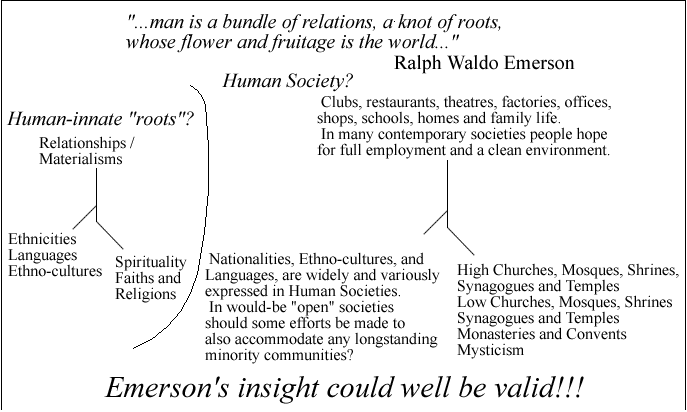Learning from History
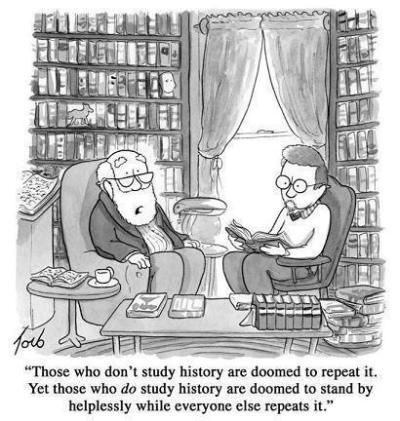
When it comes to the possibilities of 'learning from history' there are doubtless many things we could aspire to learn.
Some of those would be more practically useful, in terms of contributing to the normal and decent functioning of well-meaning societies than others.
The following selection of famous quotations and quotes about ' learning from history ' begins with a few quotes in which several persons express some disillusionment about Humanity's all-too-frequent failure at actually learning from history or the past mistakes of history.
The selection soon continues with other quotations where such seriously famous observers as Edmund Burke, David Hume, Immanuel Kant, Ralph Waldo Emerson and Machiavelli present views that very directly suggest that learning deep lessons from history is both possible and desirable.
Our overview of this learning from history may not so much explicitly focus importance on the broader range of past mistakes of history, of which there are many, as learning useful lessons about - The Human Condition AND Social Change.
This can show, through cautionary examples, how past mistakes and serious misjudgements have arisen from time to time disrupting the normal and decent functioning of would-be well-meaning societies.
History:
"An account, mostly false,
of events, mostly unimportant,
which are brought about by rulers, mostly knaves,
and soldiers, mostly fools."
Ambrose Bierce

"We spend a great deal of time studying history, which, let's face it, is mostly the history of stupidity."
Stephen Hawking

"Rulers, Statesmen, Nations, are wont to be emphatically commended to the teaching which experience offers in history. But what experience and history teach is this - that people and governments never have learned anything from history, or acted on principles deduced from it. Each period is involved in such peculiar circumstances, exhibits a condition of things so strictly idiosyncratic, that its conduct must be regulated by considerations connected with itself, and itself alone."
G. W. F. Hegel

"We learn from history that we learn nothing from history."
George Bernard Shaw

"We can learn from history, but we can also deceive ourselves when we selectively take evidence from the past to justify what we have already made up our minds to do."
Margaret MacMillan

"Those who cannot learn from history are doomed to repeat it."
George Santayana
(The above quote also frequently appears as "those who do not learn from history" and as "those who ignore history")

"Those that fail to learn from history, are doomed to repeat it."
Winston Churchill

"Human nature will not change. In any future great national trial, compared with the men of this, we shall have as weak and as strong, as silly and as wise, as bad and as good. Let us therefore study the incidents in this as philosophy to learn wisdom from and none of them as wrongs to be avenged."
Abraham Lincoln (in the context of The American Civil War of 1861 to 1865)

"In history, a great volume is unrolled for our instruction, drawing the materials of future wisdom from the past errors and infirmities of mankind."
Edmund Burke

"History is for human self-knowledge ... the only clue to what man can do is what man has done. The value of history, then, is that it teaches us what man has done and thus what man is."
R. G. Collingwood

"Mankind are so much the same, in all times and places, that history informs us of nothing new or strange in this particular. Its chief use is only to discover the constant and universal principles of human nature."
David Hume

"Whoever wishes to foresee the future must consult the past; for human events ever resemble those of preceding times. This arises from the fact that
they are produced by men who ever have been, and ever shall be, animated by the same passions, and thus they necessarily have the same results."
Machiavelli
Machiavelli

"History cannot give us a program for the future, but it can give us a fuller understanding of ourselves, and of our common humanity, so that we
can better face the future."
Robert Penn Warren
Robert Penn Warren

"Together we must learn how to compose difference, not with arms, but with intellect and decent purpose."
Dwight D. Eisenhower
Dwight D. Eisenhower
Such celebrated "Men of Letters" as Emerson and Shakespeare have accepted that Human Nature is 'Tripartite' and Emerson accepted that there was an investigable association between Human Nature and History.
Ralph Waldo Emerson
RALPH WALDO EMERSON (1803-1882) was, in his time, the leading voice of intellectual culture in the United States. He remains widely influential to this day through his essays, lectures, poems, and philosophical writings.
In the later eighteen-twenties Ralph Waldo Emerson read, and was very significantly influenced by, a work by a French philosopher named Victor Cousin.
A key section of Cousin's work reads as follows:
"What is the business of history? What is the stuff of which it is made? Who is the personage of history? Man : evidently man and human nature.
There are many different elements in history. What are they? Evidently again, the elements of human nature. History is therefore the development of humanity,
and of humanity only; for nothing else but humanity develops itself, for nothing else than humanity is free. …
… Moreover, when we have all the elements, I mean all the essential elements, their mutual relations do, as it were, discover themselves. We draw from the nature of these different elements, if not all their possible relations, at least their general and fundamental relations."
Introduction to the History of Philosophy (1829)
… Moreover, when we have all the elements, I mean all the essential elements, their mutual relations do, as it were, discover themselves. We draw from the nature of these different elements, if not all their possible relations, at least their general and fundamental relations."
Introduction to the History of Philosophy (1829)
Even before he had first read Cousin, (in 1829), Emerson had expressed views in his private Journals which suggest that he accepted that Human Nature, and Human Beings, tend to display three identifiable aspects and orientations:
Imagine hope to be removed from the human breast & see how Society will sink, how the strong bands of order & improvement will be relaxed & what a deathlike stillness would take the place of the restless energies that now move the world. The scholar will extinguish his midnight lamp, the merchant will furl his white sails & bid them seek the deep no more. The anxious patriot who stood out for his country to the last & devised in the last beleagured citadel, profound schemes for its deliverance and aggrandizement, will sheathe his sword and blot his fame. Remove hope, & the world becomes a blank and rottenness.
(Journal entry made between October and December, 1823)
In all districts of all lands, in all the classes of communities thousands of minds are intently occupied, the merchant in his compting house, the mechanist over his plans, the statesman at his map, his treaty, & his tariff, the scholar in the skilful history & eloquence of antiquity, each stung to the quick with the desire of exalting himself to a hasty & yet unfound height above the level of his peers. Each is absorbed in the prospect of good accruing to himself but each is no less contributing to the utmost of his ability to fix & adorn human civilization. (Journal entry of December, 1824)
Our neighbours are occupied with employments of infinite diversity. Some are intent on commercial speculations; some engage warmly in political contention; some are found all day long at their books … (This dates from January - February, 1828)
In all districts of all lands, in all the classes of communities thousands of minds are intently occupied, the merchant in his compting house, the mechanist over his plans, the statesman at his map, his treaty, & his tariff, the scholar in the skilful history & eloquence of antiquity, each stung to the quick with the desire of exalting himself to a hasty & yet unfound height above the level of his peers. Each is absorbed in the prospect of good accruing to himself but each is no less contributing to the utmost of his ability to fix & adorn human civilization. (Journal entry of December, 1824)
Our neighbours are occupied with employments of infinite diversity. Some are intent on commercial speculations; some engage warmly in political contention; some are found all day long at their books … (This dates from January - February, 1828)
The quotes from Emerson are reminiscent of a line from another "leading voice of intellectual culture" - William Shakespeare.
There's neither honesty, manhood, nor good fellowship in thee.
William Shakespeare: Henry IV (Pt 1), Act I, Scene II
William Shakespeare: Henry IV (Pt 1), Act I, Scene II
"The first glance at History convinces us that the actions of men proceed from their needs, their passions, their characters and talents; and impresses us with the belief that such needs, passions and interests are the sole spring of actions."
Georg Hegel, 1770-1831, German philosopher, The Philosophy of History (1837)
Plato, Socrates and Shakespeare endorse a 'Tripartite Soul' view of Human Nature
Undeniably authoritative key insights, (from the Great Faiths, Plato, Socrates, Pythagoras, Shakespeare and Ralph Waldo Emerson!!!), are available on this site that give convincing support to such a "Tripartite" view of Human Nature!!!
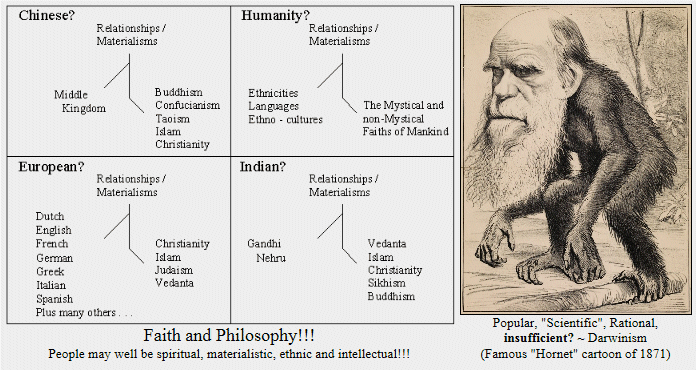
On another of our pages ~ Understanding the Past and the Present ~ suggestions are made that such "Tripartism" would support persons living out their lives long, long ago in tribes and in city-states.
Capacities of Honesty, Manhood and Good-fellowship would all be highly beneficial to persons living in such small-scale Human groupings as tribes and in city-states.
Individuals would tend to behave considerately towards their group-fellows, be capable of co-operation in defence of their group and be capable of entering into personal relationships and economic activity.
City-states can be held to have been more viable than hunter-gatherer tribes because there could have been greater food security through stored agricultural surpluses and more opportunity to enter into trade within and between city-states.
More recently Europe featured Monarchies and Empires - where some men worked, some men fought (Knights) and some men prayed (Priests). Such dynastic sovereignty being displaced in time by Constitutional Monarchies and Republics where democracy applies.

Ralph Waldo Emerson wrote that:-
"...man is a bundle of relations, a knot of roots,
whose flower and fruitage is the world..."
~ Should this be true it would follow that Human Societies often tend to arise out of the Human Condition as directly influenced by Human Nature!
"...man is a bundle of relations, a knot of roots,
whose flower and fruitage is the world..."
~ Should this be true it would follow that Human Societies often tend to arise out of the Human Condition as directly influenced by Human Nature!

N. B. The page mentioned in the graphic ~ roots.asp ~
has been replaced by this page
This 'knot of roots' insight features in:
According to the seriously influential philosopher Immanuel Kant, in his brief work entitled "Idea for a Universal History from a Cosmopolitan Point of View" :-
"Whatever concept one may hold, from a metaphysical point of view, concerning the freedom of the will, certainly its appearances,
which are human actions, like every other natural event, are determined by universal laws. However obscure their causes, history,
which is concerned with narrating these appearances, permits us to hope that if we attend to the play of freedom of the human will
in the large, we may be able to discern a regular movement in it, and that what seems complex and chaotic in the single individual
may be seen from the standpoint of the human race as a whole to be a steady and progressive though slow evolution of its original endowment."
Or to quote Emerson, from his famous Essay ~ History more fully:-
"In old Rome the public roads beginning at the Forum proceeded north, south, east, west, to the centre of every province of the empire, making each market-town of Persia, Spain, and Britain pervious to the soldiers of the capital: so out of the human heart go, as it were, highways to the heart of every object in nature, to reduce it under the dominion of man. A man is a bundle of relations, a knot of roots, whose flower and fruitage is the world. His faculties refer to natures out of him, and predict the world he is to inhabit, as the fins of the fish foreshow that water exists, or the wings of an eagle in the egg presuppose air. He cannot live without a world."
This passage is also to be found in Ralph Waldo Emerson's Essay ~ History:-
"There is one mind common to all individual men....
....Of the works of this mind history is the record. Man is explicable by nothing less than all his history. All the facts of history pre-exist as laws. Each law in turn is made by circumstances predominant. The creation of a thousand forests is in one acorn, and Egypt, Greece, Rome, Gaul, Britain, America, lie folded already in the first man. Epoch after epoch, camp, kingdom, empire, republic, democracy, are merely the application of this manifold spirit to the manifold world."
1848 : the ruling Dynasties of Europe
In February 1948, the British historian Lewis Namier delivered a lecture commemorating the centennial of the European Revolutions of 1848.
In this lecture Namier presented facts about the historical developments, themes, and events evident in 1848 and reached the conclusion that:-
Learning lessons of history can surely be seen as a pressing necessity in the hope of yielding up some guidlines for the adoption of practical policies intended to enhance the possibility for the lessening of injustices and for the avoidance of conflict.
We would hope that our coverage of this "dramatic historical watershed" will provide something of a persuasive outline as to how it came about that the Dynastic Europe of 1815 came to undergo those sweeping changes which have tended to produce the populist Europe of Modern Times!
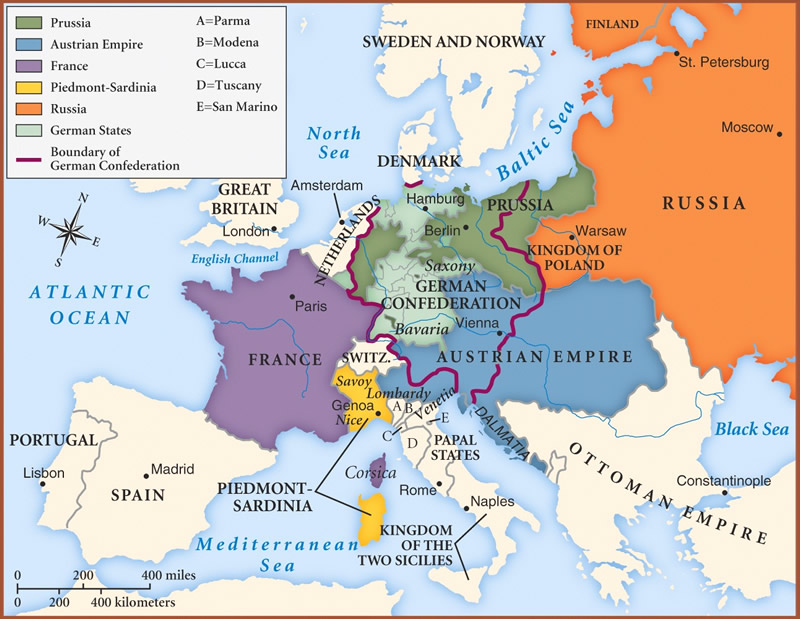
The European political map above, agreed at the Congress of Vienna of 1815, saw some changes, (principally due to the emergence of Belgium and Greece), before the widespread Revolutions of 1848-1849.
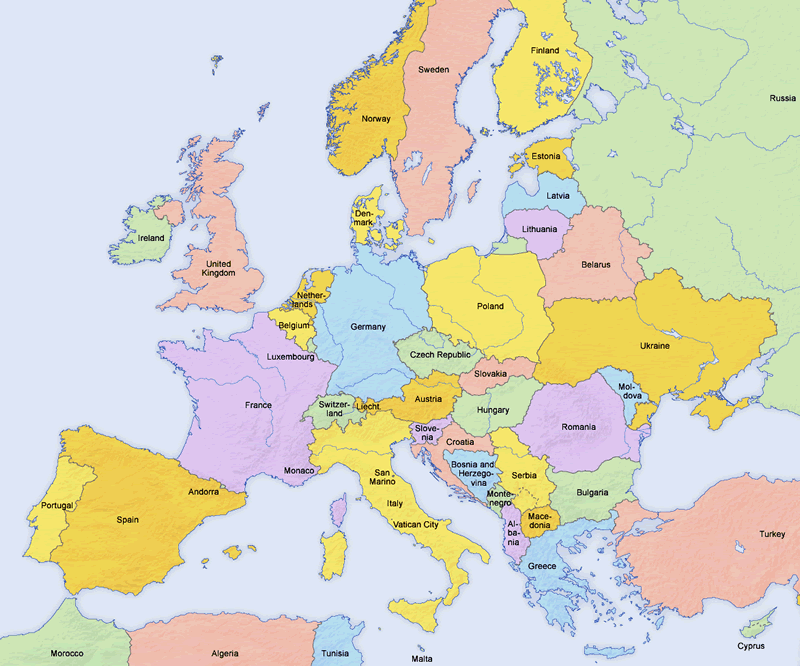
The above map was placed on this page in 2013 and was even then a little out-of-date due to The Crimea
~ a southern peninsula of Ukraine since 1954 ~
seceding, early in 2014, to become closely linked with the Russian Federation).

[N.B. Our Series of European History pages focus mostly on Europe in the nineteenth century and continue with coverage of Italian Unification, (as orchestrated by Cavour), and German Unification, (as orchestrated by Bismarck), and the Diplomacy underlying the settlements to the First World War ~ another tempestuous historical watershed ~ (as influenced by Woodrow Wilson].
Or to quote Emerson, from his famous Essay ~ History more fully:-
"In old Rome the public roads beginning at the Forum proceeded north, south, east, west, to the centre of every province of the empire, making each market-town of Persia, Spain, and Britain pervious to the soldiers of the capital: so out of the human heart go, as it were, highways to the heart of every object in nature, to reduce it under the dominion of man. A man is a bundle of relations, a knot of roots, whose flower and fruitage is the world. His faculties refer to natures out of him, and predict the world he is to inhabit, as the fins of the fish foreshow that water exists, or the wings of an eagle in the egg presuppose air. He cannot live without a world."
This passage is also to be found in Ralph Waldo Emerson's Essay ~ History:-
"There is one mind common to all individual men....
....Of the works of this mind history is the record. Man is explicable by nothing less than all his history. All the facts of history pre-exist as laws. Each law in turn is made by circumstances predominant. The creation of a thousand forests is in one acorn, and Egypt, Greece, Rome, Gaul, Britain, America, lie folded already in the first man. Epoch after epoch, camp, kingdom, empire, republic, democracy, are merely the application of this manifold spirit to the manifold world."
1848 : the ruling Dynasties of Europe
challenged by Socio-political aspirations
We have prepared some fairly detailed, but hopefully "truth-full and informative", pages about a most deeply revealing episode in European History in the spirit of attempting to learn worthwhile lessons of history!!!
The events of 1848 display the existence and latent power of many societal pressures which have subsequently fully contributed to the "Emergence of Modernity" in the Western world.
Prior to 1848 the existence of these societal pressures was often unsuspected or ignored, - their latent power was certainly vastly unappreciated.
The events of 1848 display the existence and latent power of many societal pressures which have subsequently fully contributed to the "Emergence of Modernity" in the Western world.
Prior to 1848 the existence of these societal pressures was often unsuspected or ignored, - their latent power was certainly vastly unappreciated.
In February 1948, the British historian Lewis Namier delivered a lecture commemorating the centennial of the European Revolutions of 1848.
In this lecture Namier presented facts about the historical developments, themes, and events evident in 1848 and reached the conclusion that:-
"1848
remains a seed-plot of history. It crystallized ideas and projected the pattern of
things to come; it determined the course of the following century."
If Namier is right in viewing the "Revolutions of 1848" as featuring a seed-plot of history, and if we can identify the early attempts at growth
and development by such evident resulting "seedlings" as Liberalism, Constitutionalism, Democracy, Socialism and Nationalism ~ including such competition
as came to exist between them for "a Place in the Sun" (in situations where, although shaken, down-but-not-out dynastic authority was usually trying to
suppress them, fairly successfully in 1848 and with diminishing effectiveness over ensuing decades) then surely we will
have succeeded to some degree in actually learning lessons of history.Learning lessons of history can surely be seen as a pressing necessity in the hope of yielding up some guidlines for the adoption of practical policies intended to enhance the possibility for the lessening of injustices and for the avoidance of conflict.
We would hope that our coverage of this "dramatic historical watershed" will provide something of a persuasive outline as to how it came about that the Dynastic Europe of 1815 came to undergo those sweeping changes which have tended to produce the populist Europe of Modern Times!

The European political map above, agreed at the Congress of Vienna of 1815, saw some changes, (principally due to the emergence of Belgium and Greece), before the widespread Revolutions of 1848-1849.

The above map was placed on this page in 2013 and was even then a little out-of-date due to The Crimea
~ a southern peninsula of Ukraine since 1954 ~
seceding, early in 2014, to become closely linked with the Russian Federation).

[N.B. Our Series of European History pages focus mostly on Europe in the nineteenth century and continue with coverage of Italian Unification, (as orchestrated by Cavour), and German Unification, (as orchestrated by Bismarck), and the Diplomacy underlying the settlements to the First World War ~ another tempestuous historical watershed ~ (as influenced by Woodrow Wilson].

